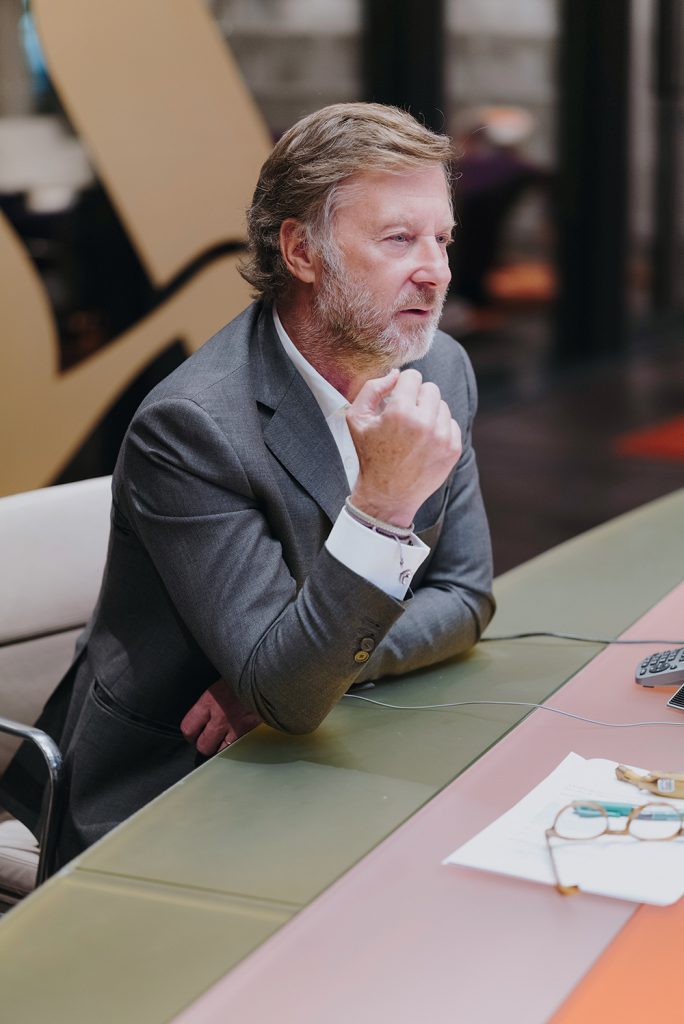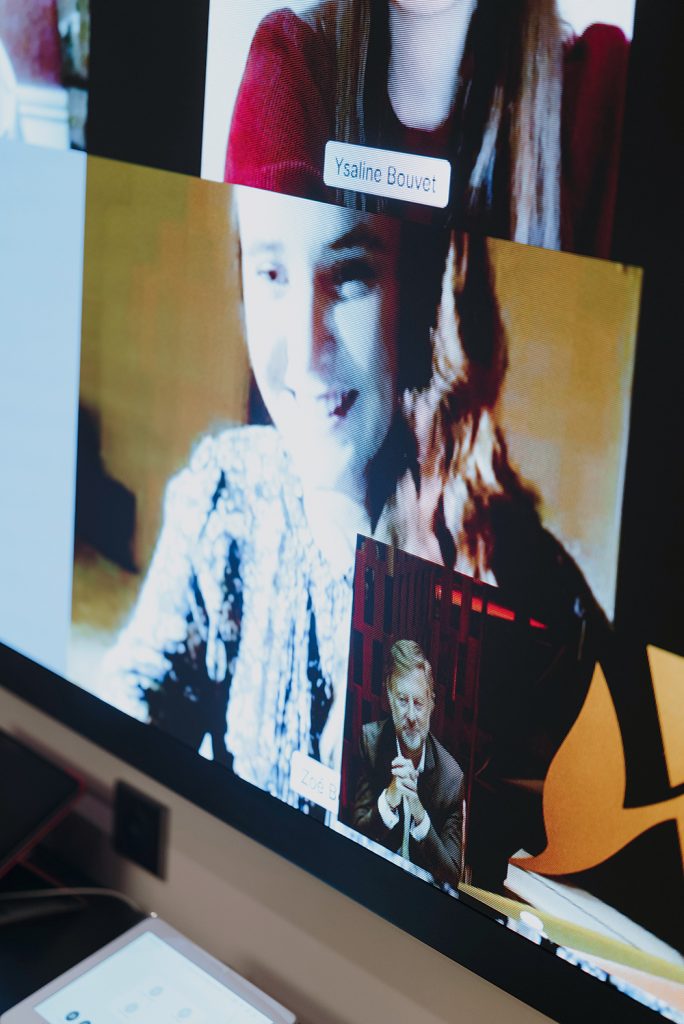Sébastien Bazin, Accor CEO, Answers Students’ Questions
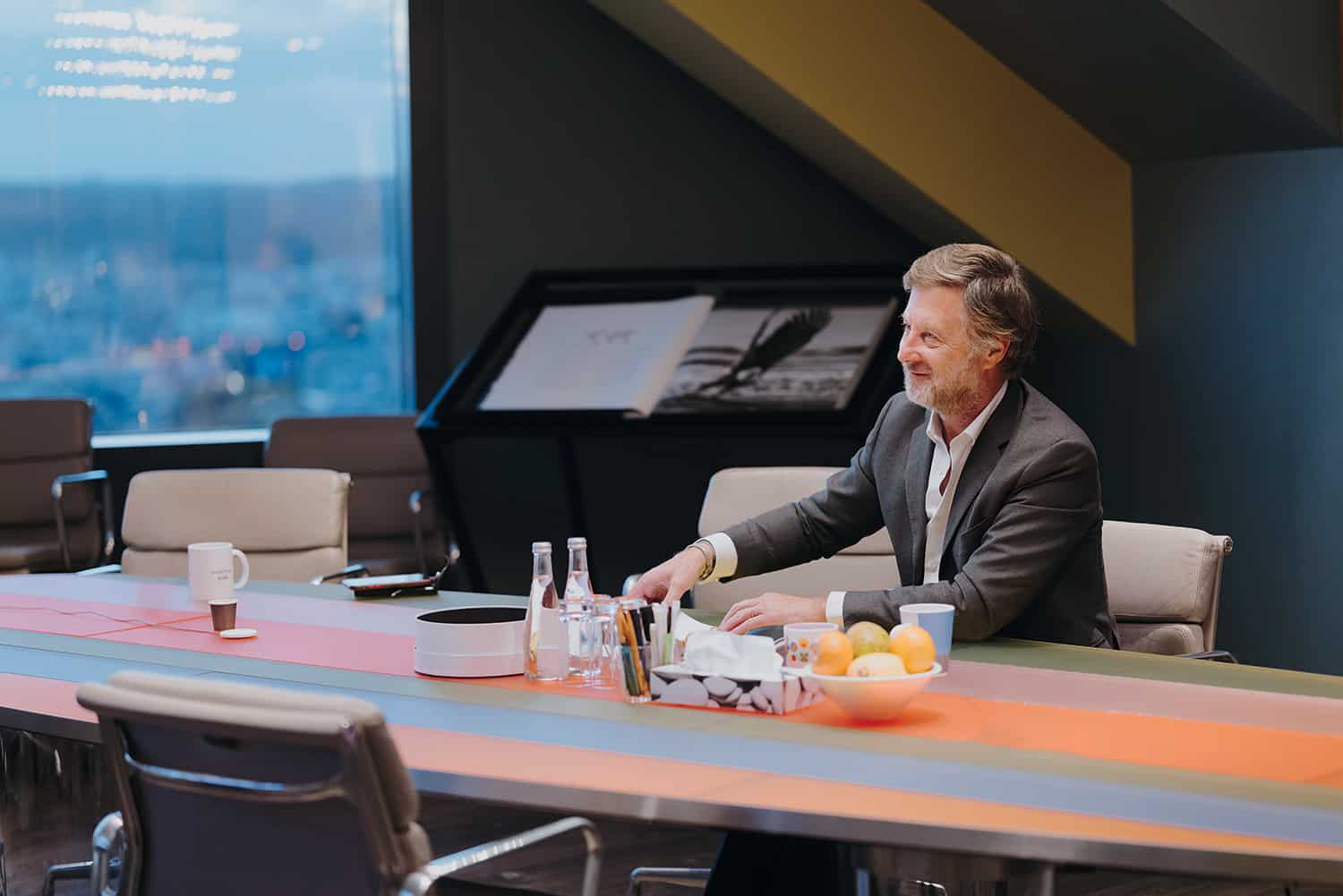
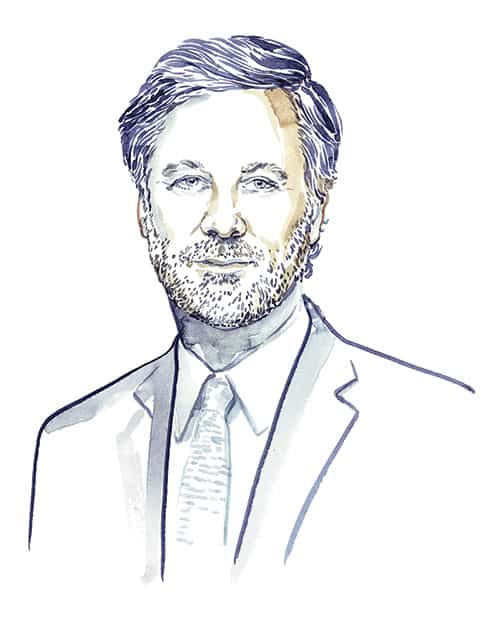
1961 – Born in Boulogne-Billancourt 1985 – Masters in management, Panthéon-Sorbonne University
1990 – Head of the investment bank Hottinguer Rivaud Finances
1997 – Joined the Colony Capital fund. Oversaw the acquisitions of Data IV (the European leader in data centers), Buffalo Grill, Paris Saint-Germain, etc. 2009 – Named President of Paris Saint-Germain, of which Colony Capital is a shareholder
2013 – CEO of Accor 2016 – Acquisition of the three luxury brands Fairmont, Raffles, and Swissôtel
2018 – Accor sells most of its real estate holdings for 4.4 billion euros 2020 – Turnover dropped by 64% in the third trimeste
Sébastien Bazin is a UFO in the small world of French CEOs. He rose to become head of Accor seven years ago without having held previous posts in the group and without a diploma from one of France’s prestigious schools. The friendly 50-something had forged a career in finance, in the investment firm Colony Capital. This led him, in 2009, to become president of Paris Saint-Germain. He enjoyed being in the spotlight.Known for his charm and charisma, nicknamed Kaa in honor of the hypnotizing snake in “The Jungle Book”, he was able to quickly put three HEC students at ease at the beginning of the interview thanks to his informal manner and modesty. Because of the lockdown, the interview was a videoconference. When he came to Accor in 2013, the group’s employees treated him extremely coldly. (“You can’t imagine how much we hate you here,” one of them told him, according to Les Échos.) This Breton did not let this chilly welcome get him down.
Under his leadership, the group diversified and moved into the luxury sector, particularly through its acquisition of the Fairmont, Raffles and Swissôtel brands in 2016. Since then, the hotel business has been decimated by Covid 19. People aren’t traveling anymore, and business trips have become rare. Professional meetings are held via Zoom, and events have been cancelled. “We served 1.4 billion travelers in 2019 and we expect the total to be 400 million in 2020. We’ve gone 30 years back into the past,” said Jean-Jacques Morin, Accor’s financial director, in interviews with the press. In the midst of this upheaval, Sébastien Bazin was lucky. Before the crisis hit, Accor had raised several billion euros through the sale of its hotel real estate holdings. His effort to take on the government’s 14% share in Air France had fallen by the wayside, which, given subsequent events, turned out to be a blessing in disguise. Kaa can thank his lucky stars.
The hotel business in the Covid era
Zoé Bourlard: Accor is the European hotel-sector leader. You have the responsibility for 320,000 employees in 110 countries. How do you feel in this catastrophic time for the sector?
Sébastien Bazin : Everything that’s happening now is disastrous, complex, unpredictable. I don’t have any points of reference. And yet, I feel amazingly strong. We have never taken as much time for reflection as we have for the past nine months. We’re taking advantage of this period to open the hood of the car, to question how we do things, to find new projects.
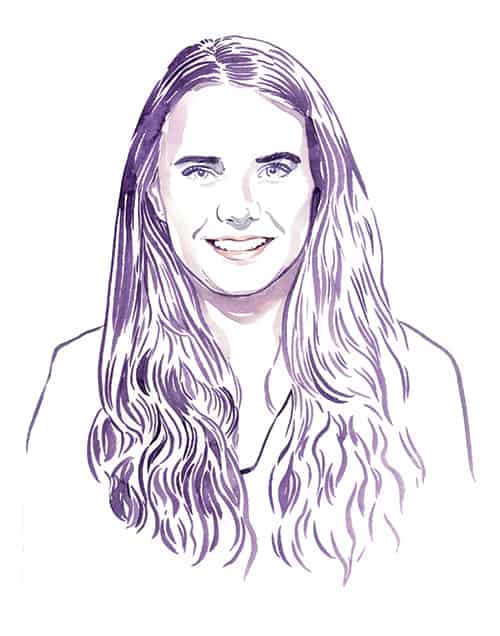
After her studies at the Lausanne Hotel School, Zoe entered the HEC Entrepreneurs Master X program with the goal of launching a company specializing in helping hotels in difficulty. She wants to contribute to the sector’s recovery after the covid crisis.
2016 – English teacher for a humanitarian project in the Sacred Valley of the Incas, Peru
2017 – Internship at the Palace Wellington in Madrid, involved in customer relations and quality controls in rooms
2019 – Responsible for the LVMH events account at Group M France
Zoé: What do you mean by “opening the hood”?
S.B. : In April-May, 90% of our hotels were closed. We devoted this time to examining the basic parts of the group, what drives its activities. We checked the spark plugs, the engine, the crucial elements – the essential brands, priority countries, indispensable talents, but also the things we no longer needed because they were redundant or because our customers no longer thought they were important. We dissected all the 7,000 tasks that our group handles in the 110 countries where it operates.
Zoé: When the pandemic is over, when we’ve found a vaccine, the hotel sector will emerge from the crisis severely weakened. Will the hotel business still draw young graduates? Before HEC Paris, I studied at the Lausanne Hotel School, and I would really like to work in this field.
S.B. : Do you miss your uniform, Zoe?
Zoé: Not really… but I’m worried about the sector.
S.B. : Don’t worry. Tourism will take off again. It’s the most beautiful industry in the world, blessed by the gods. Look at searches done on Google. People want to breathe freely more than anything, travel, escape, meet new people… The proof? A spike in activity we registered in France in July-August 2020! What I’m most concerned about is how digital tools like Zoom and Teams will affect business travel. Salespeople now begin their prospecting on the web. Only after that will they take a car, train or plane to meet people. I’m going to lose part of my business-travel customers, but will the percentage be 10%, 15% or 20%? We know this, and we had better prepare for it by inventing new services to compensate for this impact of the crisis….
Ysaline Bouvet: Your group will survive the crisis. What about restaurants and independent hotels?
S.B. : If you take cafes, hotels and restaurants in France, and add tourism-related professions like travel agents, you will have a total of 350,000 companies that employ 2.5 million people. This is the leading sector in France, far outpacing finance and healthcare! It represents one job out of 10, and even one job out of five created over the past five years. In short, it’s a vital part of our economy. 80% of those 350,000 companies have fewer than six employees. They lack funds, digital tools, expertise. They are fragile. The lockdown created a dramatic situation. Two-thirds of tourism professionals do not have advanced diplomas. They have limited chances to find other jobs. They have to hold on. You say, Ysaline, that Accor will survive, but what good will that do if the independents disappear? Giants like us need small companies. When a client reserves a hotel room in Clermont-Ferrand or Laos, it’s to discover local gastronomy, to have new experiences. If the bars and restaurants disappear, I will lose my leisure customers.
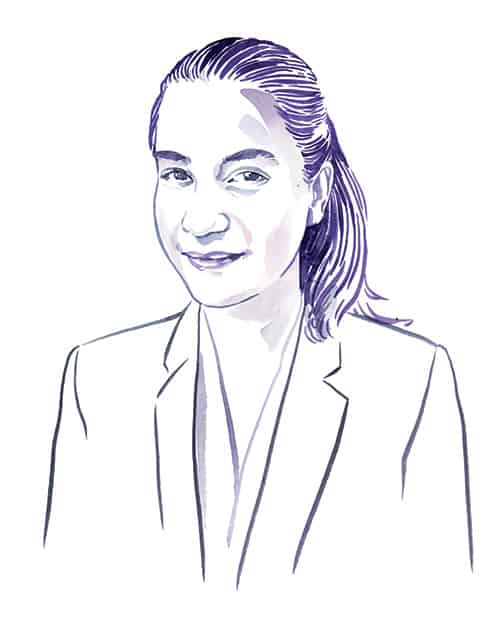
Excited about finance, Ysaline is completing a masters program in political and ethical philosophy along with her studies in Jouy-en-Josas. When she’s not on stage with Double-Jeu, HEC’s theatre troupe, she rows on the Seine with members of the rowing club. She’s also a member of Esp’R, the campus ecology association.
2016 – Wins the Clara prize, a literary award for adolescents, for her short story “Terre-happy” (“Happy-Earth”)
2017 – Intern in oral arguments for the NGO Plan International, which sponsors children in developing countries
Zoé: Has the crisis created diversification opportunities for you?
S.B. : Yes. I don’t have a choice, in any case. I have to compensate for the reduction in my business-travel clients, which represent around 60% of my business. (To put it simply, hotels are filled from Sunday night through Thursday night by executives, and on the weekend by families). Telecommuting is an important possibility. Employees don’t want to waste an hour and a half in mass-transit systems to get to the office. But, they also don’t want to stay at home, because that often means working in the kitchen or in a tiny space. So, we’re going to position our hotels as a third choice. We tested this with our 2,000 employees in the Paris region. 80% of them live less than 20 minutes from an Accor hotel. 40% of them tested telecommuting at a hotel. Our establishments have everything they need: conference rooms, WiFi, coffee machines… It’s a simple way to diversify.
Zoé: Accor hasn’t been part of the CAC 40 since last year. What do the employees think of this ?
S.B. : For 90% of them, this issue is not at all important. As for me, I was sad for the founders of the business, Gérard Pélisson et Paul Dubrule. But that’s life. It’s the same company, whether it’s number 41 or 39. It sounds a bit less chic when you’re at a sophisticated dinner party, but since I don’t go to sophisticated dinner parties, I don’t care about that.
Zoé: Doesn’t this exit from the index make the group more vulnerable to a takeover, especially in the current context? Some of your shareholders boughtAccor stocks because they wantedto invest in a CAC 40…
S.B. : Index funds represented only 2.5% of the group’s capital. So, leaving the CAC 40 had only a minor effect on how we’re valued. Also, you know, I don’t stress about things I have no control over. It’s useless; best to put them out of one’s mind.
Luc-Olivier Briand: A growing number of tourists are concerned about their ecological footprint.Hotels seem to be backward in this, since they contribute to wasting food and heating. Is Accor doing enough for the planet?
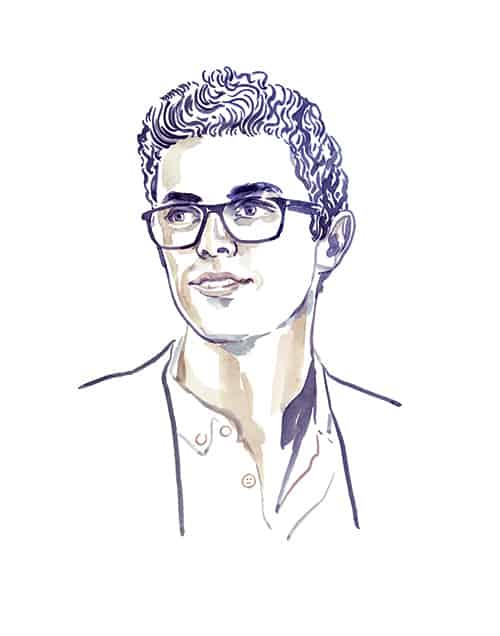
Secretary-General of Double-Jeu, HEC’s theater troupe, responsible for the campus music venue for Assrock and in charge of physical training for the handball club, Luc-Olivier is working toward the double diploma HEC-ISAE-Supaero, aiming for a career in the aerospace industry.
2016 – Young ambassador to UNICEF France
2018 – Diploma in math from Paris-Saclay University
2020 – Oversees editing a musical comedy in 48 hours
S.B. : Probably not. But, we have already done a lot. I’ll give you an example: our clients can request that the sheets and towels in their rooms not be changed. Thanks to the money we save from this, we have planted 7.2 million trees since 2009. This is just one example; there are others. In fact, 10% of my bonus is linked to the group’s reaching its objectives concerning social and environmental responsibility.
Luc-Olivier: How do you rate the group on environmental responsibility compared to your competitors?
S.B. : We’re several years ahead in the fight against food waste. We signed an agreement with the app Too Good to Go. Since 2016, 650 Accor hotels have redistributed almost 500,000 meals, thus avoiding more than 200 tons of garbage. As for energy consumption, we’re at the same level as our competitors. We have also committed to eliminating single-use plastics by 2022. There’s one thing we’ve done that none of our competitors has managed to do: 99% of the employees we hire are locals. And each person hired supports around four people, on average. One of the Accor group’s outstanding qualities is its extraordinary willingness to embrace other cultures. From Chile to Japan by way of Peru, Nigeria, South Africa, Laos, Korea… It’s mind-boggling! “Cray-cray”, as my kids would say. Look at what the Americans have done in this crisis: turned in on themselves. InterContinental, Hyatt, Hilton and Marriott laid off 70% of their local employees to bring everything back to their global headquarters. We did exactly the opposite, by closing regional offices to expand in each country, getting closer to local markets.
Luc-Olivier: How many people do you hire per year in normal circumstances?
S.B. : In 2019, we opened a new hotel every day. We recruit 50,000 per year in our new hotels. Plus 30,000 hires to replace people who leave the group. So, 80,000 hires per year.
Ysaline: Accor is a partner in the United Nations HeForShe initiative, which promotes gender equality. But your 15-member executive committee only has…two women on it. How do you explain this paradox?
S.B. : Because we have been dumb. But this number doesn’t accurately reflect all the progress we’ve made in this matter. When I became head of the group, 22% of the hotel directors were women. We have increased this to 38% globally, and even 55% in Latin America. In the Middle East, it’s more complicated; we appointed our first female hotel director there, in Saudi Arabia, three years ago. The higher we go in the hierarchy, the more the ratio goes down. Of the top 100 executives in the group, 28 are women. On the executive committee, we have only two: Heather McCrory and Maud Bailly. We’re raising that to four with the appointment of Agnès Roquefort, head of development, and a new head of CSR set for the beginning of 2021.
Ysaline: Do you support women’s rights?
S.B. : Yes. But I have never been able to force myself to take away a man’s job to give it to a woman. If the current employee is doing a good job, I keep that person in place. It’s going to take a little more time to reach a 50/50 balance.
“Accor hires 80,000 people per year.”
Ysaline: At the Hotel Ibis in Batignolles, the employees of one of your sub-contractors have been on strike since July 2019. Chambermaids condemn their very difficult and maybe evenillegal working conditions, and they want to be hired directly by Accor. What are you going to do about this?
S.B. : Around two-thirds of the chambermaids in the Accor network are employed directly by the group. One third work for sub-contractors. This percentage is typical of all the big hotel groups. Sub-contracting allows for reducing fixed costs when occupancy rates are volatile. Our suppliers have to comply with strict requirements, including ethical and social standards. In the case of Ibis Batignolles, the sub-contractor, STN, employs around 60 chambermaids. A few of them are still on strike, even though their employer has agreed to most of their demands. But their union refuses to sign an agreement and says it wants to “make an example” of this case. This is no longer an economic issue but rather a political one. It’s out of my hands now. But restassured that we know that these people have a very tough job. What we ask them to do has long been too much for people receiving such a low salary.
Roadmap
Zoé: In 2017, the Accor group raised several billion euros by selling its real estate holdings. How were you planning to invest this war chest?
S.B. : We divested ourselves of almost all our property holdings on the principle that no one can do everything in life – especially when one is a listed company. We can’t construct buildings, maintain them and take care of their plumbing and wiring while at the same time we also need to invest in customer relations and computerization. We prefer to focus on service. It was perfect timing. Accor now has four billion euros in its coffers to help us with the crisis. There’s a saying in English, “You are between lucky and smart”. I don’t know if we were lucky or talented. No doubt a bit of both.
Zoé: Four billion. What are you going to do with it?
S.B. : This is not the time to be too daring, Zoé. It’s a time to sit back and take stock. It’s clear that sometimes we accomplish a lot in periods of crisis. But it’s better to pay a bit more a bit later than to invest in acquisitions when the worst is perhaps yet to come. So, for the first time in my life, I’m holding myself back. Even though this is not my style at all!
Zoé: These cash reserves; is that what’s saving you now?
S.B. : It gives us a precious kind of freedom. We do not have to depend on the markets, government loans, a recovery plan or subsidies for the tourism sector.
Zoé: What was the most difficult decision you made this year?
S.B. : At the end of March, we put 280,000 employees around the world on partial unemployment to keep the hotels from going bankrupt. In a little less than half of the 110 countries where we operate, employees do not have any right to collect unemployment. So, we took action. We convinced the board of directors to allocate 70 million euros, or a quarter of the 280 million euros in dividends that had originally been anticipated, to create a solidarity fund, the ALL Heartist Fund. We provided support to 45,000 employees, of whom half live in Southeast Asia. They each received between 300 and 1,000 euros. You can’t imagine how many cards, videos and thank-you letters we got. As for everyone’s emotional reaction, it’s 9.5 out of 10. [Silence]. That’s it; I’ve killed the mood!
Ysaline : You haven’t been able to carve out a market niche to compete with Booking. Why the failure ?
S.B. : Probably because we didn’t explain the project to our franchises well enough. They thought we were putting them into direct competition with independents who weren’t associated with the Accor brand. Most of all, we didn’t invest enough in making our platform known. Why are Booking, Alibaba, Amazon and Google so powerful? Because they spend hundreds of millions of euros in communications. We’re not fighting with the same weapons.
“Decisions should first be made with the gut.”
Luc-Olivier: Reports that Booking publishes every year indicate that tourists are looking for experiences with local populations. How can the hotel business, which tends to standardize operations worldwide, respond to this desire for authenticity?
S.B. : Booking talks about it, but Booking is damn sure not capable of doing it! The big difference between us and Booking, Expedia and Airbnb is that these Internet players never meet clients. In the hotel business, we always have human contacts, whether they last 10 minutes or three days. The Internet is a cold industry, and we’re a warm one. To answer your question, we’ve put a lot of effort into making our offering less standardized. Five years ago, the group was 80% European and depended 80% on three brands: Ibis, Novotel and Mercure – pretty homogenous chains. Today, Europe accounts for less than half of our activity, and these three brands represent less than half of our turnover. We have 40 brands. If you’ve ever been to a Delano, Mondrian, SLS, Mama Shelter or 24Hours, you know that the experience is anything but ordinary. Check out all.accor.com to get an idea!
Not the usual path
Luc-Olivier: From a financier to the head of a multinational tourism company, by way of the presidency of PSG, your career is pretty atypical. When you took over Accor, some unions described you as a “gravedigger” and the employees resisted you. How did you make it through this transition?
S.B. : As best I could. I think that people were wrong about me. When you work in finance and you’re asked about your profession at a dinner party, you’re never asked another question again. If you’re an architect, gynecologist or writer, people will ask you all kinds of questions. A financier; that’s off-putting. People think you’re venal.
Luc-Olivier: What made you take the plunge?
S.B. :I wanted to get out of the financial world. I wanted to meet people, take risks, and – this is very narcissistic – have an impact. Few people have an impact in the financial world. So, I spent a lot of time meeting with my employees and partners, listening to their problems, trying to get them on board. And, in fact, I love that kind of thing. The only way to go is to care about others. If you don’t, you should never be the head of a company. It will never work. You’ll sound fake.
Ysaline: What advice did people give you when you were our age?
S.B. : I never went to HEC; I had a pitiful university education. But I was given two pieces of advice. The first came from my parents: “Do what you want, but be happy.” The second was from my grandmother. “When you walk down a street, never look at your feet. Look up to the first floor.” So OK, if you’re walking down the street looking up at the first floor and you run into someone, it’s not so practical. So, I look people in the eye.
Ysaline: Do you have any advice for us?
S.B. : Don’t live your life to please others. Don’t worry about what they think of you. If you do, you’re just playing a role; you’re no longer yourself. Be honest and happy, and everything will turn out well. Being shifty, too humble, arrogant or condescending: forget all that. It will never work. People who want to prove something to others always fail miserably, even if they have had a great education.
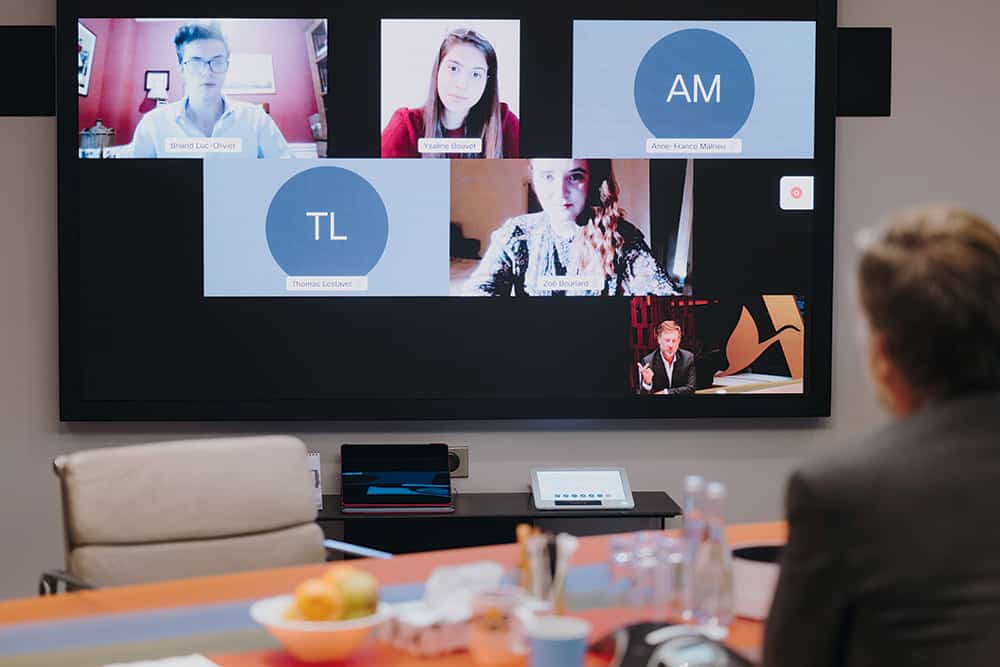
Zoé: When you’re the CEO of Accor and you go to a dinner party, what happens?
S.B. : Right now I’m skating on thin ice, to put it mildly.At a dinner party, people give me their advice. Everyone thinks they know how to run a hotel, which is partly true. You don’t need a prestigious education to run a hotel. You just need to care about people, behave yourself and work hard.
Zoé: What’s the question you’re asked most often?
S.B. : “Can I get a special price for a hotel room?” Nine times out of 10..
Zoé: Have you been able to balance your life at Accor and your personal life?
S.B. : In my 35-year career, I’ve never mixed the two. Never. I’ve never made friends with colleagues or partners, because it’s not healthy. We can spend a weekend together for a seminar, but I’d never go on vacation with them.
Zoe: What do you do to take a breather, get your mind off your job?
S.B. : When I’m barefoot in a sailboat, I’m completely fulfilled. I’m a Scorpio, Breton; I need water and wind. I also spend time with my family. The things I wasn’t able to do with my children, I do with my grandchildren. It gives me energy!
Ysaline: Do you have more free time now than when you were working in finance?
S.B. : No. But I’m less of an idiot. I’m no longer always rushing toward things or just dealing with what’s in front of me. I’m able to take a step back. In my former life, I made decisions quickly and their only consequences were financial. I could make a mistake four times out of six. If I were right six times out of 10, my company would win. At Accor, it’s different. 99% of the decisions I make have direct consequences for my employees or partners. I spend more time weighing the pros and cons. I think that’s called maturity. It was about time!
Ysaline: Our society seems to be more and more polarized. What does it need?
S.B. : Too many decisions are made by intelligent people who lack generosity and altruism. Decisions should first be made with the gut, then the heart, and finally with the brain. Reversing that order is a mistake.
Propos recueillis par Thomas Lestavel
Published by Thomas Lestavel


